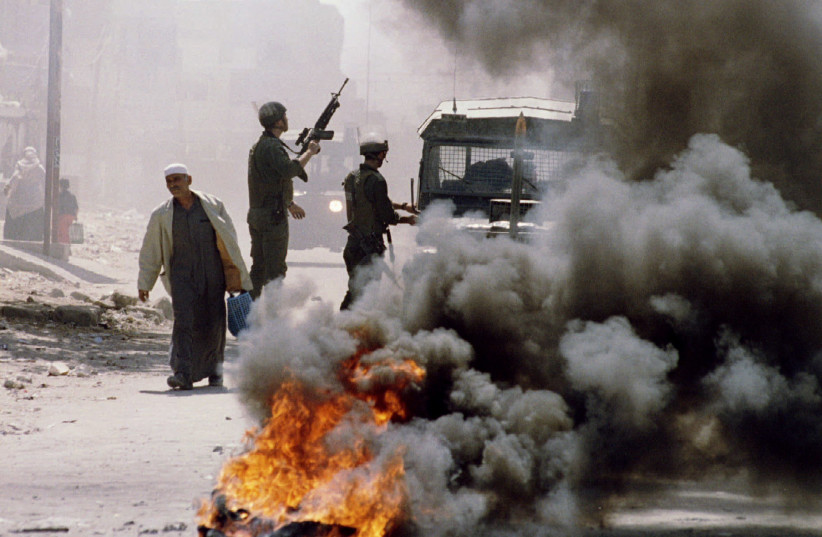The first of the two Oslo Accords risked making it impossible to secure roads leading to Israeli settlements in the West Bank and Gaza Strip then IDF chief of staff Ehud Barak warned, according to the protocol of a cabinet meeting which took place ahead of the signing of the deal in 2023 which was declassified on Tuesday.
The cabinet meeting took place on August 30, 1993, about two weeks before the Oslo I Accord (the first of the two agreements making up the Oslo Accords) was signed between Israel and the Palestine Liberation Organization (PLO) in Washington DC.
The Oslo I Accord, also called the Declaration of Principles on Interim Self-Government Arrangements, provided for the establishment of an interim Palestinian government which would eventually lead to a permanent peace agreement. The agreement would be in effect for a transitional period of at most five years.
Barak warned that the deal would make it extremely difficult for the security forces to catch terrorists before they went out to conduct attacks as they would need to figure out how to coordinate the entry of forces with the Palestinian police first.
"There is a very big assumption here concerning their cooperation and their effectiveness," said Barak. "This is not a simple problem, that the deeper you go into it and search after the different sides, you see that the current form of operations will not be able to continue."

"You need to know this in all honesty, because the current form of operations is the main anchor of our current ability to fight terrorism in Judea, Samaria, and Gaza. This issue will suffer from very severe limitations that will reflect back on their side, also concerning the effectiveness of security on thoroughfares, that as I said, from a technical level, will not be possible to secure."
Barak: Oslo Accord makes strong assumptions about Palestinians' goodwill
Barak stressed that the deal made "a very strong assumption concerning the goodwill and the effectiveness of the Palestinian police." The chief of staff added that he believed that the cooperation between the two sides would be "very limited," adding "it doesn't matter what is written in the agreements by the higher levels."
"The cooperation with the Palestinian police at the field level will be weak and forced, even at higher levels, sometimes, they will not cooperate when controversial issues arise in which a responsiveness to our requests will present questions concerning attributes of the pseudo-sovereignty that they will establish within this police."
The chief of staff additionally pointed to the possibility that deadly terrorist attacks could target Israelis after the deal, saying that would present Israel with two options: either to do nothing or to act against the agreement.
Barak stressed that if the security forces did nothing, people might start fleeing in a way that would lead to a "downfall of the sense of security." The chief of staff added that if the security forces do act "it does not exactly return us to the starting point, but it brings us to the point, which in every possible aspect, is more difficult."
Barak additionally noted that members of the groups which could carry out terrorist attacks after the deal is signed could infiltrate the police or receive leaks from the police which will help them evade Israeli forces.
Then prime minister Yitzhak Rabin stressed that if the Palestinian police did not act against Palestinian terrorists, he would see that as a violation of the agreement. The prime minister added that the Palestinian police would need to take care of Hamas or Israel would inform them that Israeli forces would.
IDF chief warns failure of Accords could make situation even worse
Barak warned the cabinet that if the deal fails the situation would not simply return to how it was, saying "from a deep fundamental point of view, it actually pushes us back to a situation which is in some ways worse."
Rabin acknowledged that the situation after the deal would be "less comfortable in terms of security, because in the current situation there is complete freedom to enter anywhere and do anything."
Rabin stressed that the IDF would need to be prepared for the risks posed by the deal as it would likely cause severe clashes between Jews and Arabs. "The potential for friction in the West Bank is enormous. In Gaza it exists, but on a smaller scale."
Rabin referred to the settlements as well, stating "Jewish settlements in the territories, especially in crowded areas, complicated everything - this was its main political goal. This was a political, not a security, settlement which did not make any contribution to national security. I would say almost the opposite, but I won't say that."
Rabin later stated that the Gush Katif settlements and a little bit of the Gush Etzion bloc of settlements were the only settlements which aided national security.
The chief of staff added that due to the existing situation in which there were dozens of settlements spread out across the territories, applying autonomy for the Palestinians for an extended period "could make both sides hostages of Arab extremists, who could act against both Jews and Arabs, in a way that would greatly exacerbate the problem."
Rabin on settler violence: 'This won't happen in real life'
When then communications minister Shulamit Aloni asked what would happen if a Jew went into a Palestinian area and committed a terrorist attack and then escaped, Rabin responded "this won't happen in real life. In real life, the police will shoot him so that there will be no misunderstanding."
